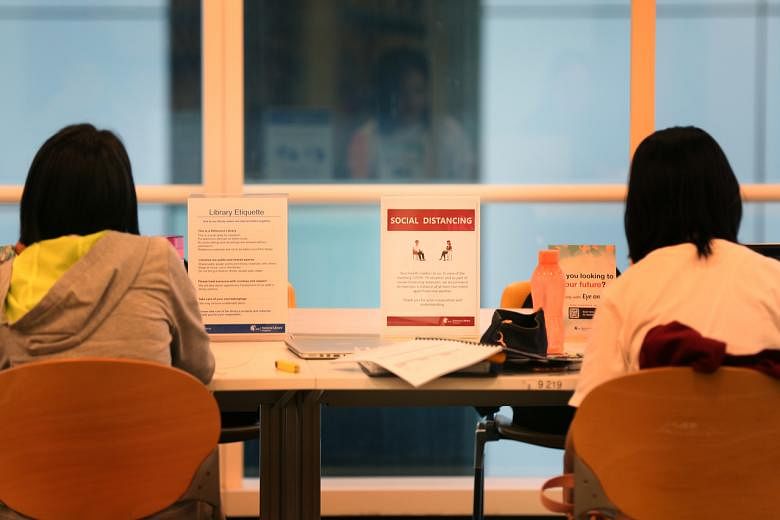SINGAPORE - "As the circuit breaker enters its fourth week, tighter social distancing measures will hopefully slow the spread of the Covid-19 pandemic."
That sentence would have made little sense as recently as January. Today, however, most people in Singapore reading this column will know what the jargon means.
Circuit breaker entered the local lexicon when Prime Minister Lee Hsien Loong used the term in his address on April 3. Covid-19 was so named only on Feb 11 by the World Health Organisation. This paper's first mention of a mysterious pneumonia, suspected to be linked to Sars (Severe Acute Respiratory Syndrome), was published on Dec 31 last year. Three days after that, the convenient label of "Wuhan virus" was tacked on, along with the use of the more scientific term of "coronavirus".
Besides sweeping away everyone's daily routines, the virus has brought a slew of new words into common usage. People have suddenly learnt terms previously bandied about mostly in the scientific world, from epidemiology to novel coronavirus to pandemic. PPE (personal protective equipment), #WFH (work from home) and HBL (home based learning) are now familiar short forms.
So much so that the august Oxford English Dictionary (OED) made an unprecedented decision earlier this month to include Covid-19 and other pandemic related terms in its records.
In a blog entry, the editors of the OED noted: "It is a rare experience for lexicographers to observe an exponential rise in usage of a single word in a very short period of time." As a result, the editors added, the OED is "updating its coverage to take account of these developments"in a departure from its usual quarterly publication cycle.
To borrow a question from Shakespeare, what's in a word? Plenty, it would seem.
In addition to triggering a global health crisis, the coronavirus has shaken up the English language lexicon and sparked discussions about the baggage carried by words.
Almost immediately after the term "Wuhan virus" was created as a convenient catchall, there was a backlash against associating the virus with a place. This is not the first time a geographical tag has been added to a disease, of course.
In the 15th century, syphilis was called the French disease because French soldiers brought it with them to Italy. The French on the other hand called it the Neapolitan disease. As the disease spread into central Asia, the Turkish called it the Christian disease while further east, the Persians named it the Turkish disease.
It is easy to dismiss such terminology as indicative of the scientific ignorance of the times. But recent racist attacks on Asians around the world show that the attitudes driving such naming conventions are still alive and well.
There is power in words and how they are used or misused. In today's woke world, people have become more aware of how politically loaded language can be. In recent days, the pandemic has hit Singapore's migrant worker dormitories especially hard. There has been some online discussions about the language used to describe this wave of infections, how physical segregation in Singapore society has carried over into linguistic segregation. The term "foreign workers" may seem innocuous, but the appellation "foreign" also carries insinuations of something alien, something that does not belong, and therefore something that can be expelled.
At a time when Singapore is fighting a pandemic, mulling over the niceties of linguistic nuance may sound like an unnecessary superfluity. But I would argue that the pandemic demands that everyone pay more attention to the kind of cultural and class biases that underlie our language use. Such biases can have real world impact.
Clarity about, and in, language is vital for communication and understanding. The proliferation of jargon is also a cause of worry at this time when important information needs to be disseminated in order to take vital action.
Take the term "social distancing". According to the OED, the phrase was first used in 1957 to describe an attitude where one chooses to maintain emotional distance from other people. The term has been hijacked to mean physical rather than psychological distance, causing no small amount of confusion in the process. Isn't it easier to just say plainly: "Stay 1m away from other people"?
Author George Orwell wrote in his 1946 essay, Politics And The English Language, that "the slovenliness of our language makes it easier for us to have foolish thoughts". Orwell would probably have been appalled by the usage of "social distancing" in today's context. As he noted, language should be "an instrument for expressing and not for concealing or preventing thought".
Unfortunately, this pandemic has also been exacerbated by an infodemic driven by social media trends as well as declining trust in science and government in some parts of the world. Combine this avalanche of information with slapdash language use and it is no wonder that people are confused about what to do.
While no one person can overcome these global trends, everyone can decide to be better educated about the pitfalls of jargon and language usage.
But not everything about language is doom and gloom. "Circuit breaker" was almost instantaneously shortened into "CB", or even "CCB" aka Covid Circuit Breaker, by wags online. They seized upon the subversive humour of equating the term with a common Hokkien vulgarity. This playful perversion might seem to be making light of a serious situation, but it serves as a fun, and funny, venting of frustration in stressful times.
English might sometimes get obfuscated by sloppy usage, but Singlish can always be depended upon for succinct expression.












